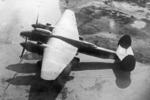Tu-2
| Country | Russia |
| Manufacturer | Tupolev Design Bureau |
| Primary Role | Medium Bomber |
| Maiden Flight | 29 January 1941 |
Contributor: C. Peter Chen
ww2dbaseIn 1940, Soviet aircraft manufacturing firm Tupolev worked on sister projects ANT-58, ANT-59, ANT-60, and Samolyot 103 in response to a Soviet request for a high speed bomber or dive bomber that was on par with contemporary German bombers such as the Ju 88 design. The prototype took flight in Jan 1941 with test pilot Mikhail Nukhtinov at the helm, and the completed design, designated Tu-2, was tweaked over a long two-year period. The first production Tu-2 medium bomber saw combat in Mar 1942, but true mass production did not start until late 1943 or early 1944. In late war actions, they were praised by the crews that served aboard them. Production of Tu-2 medium bombers ceased in 1951 after over 3,000 examples were built. After the war, many of them were exported to Soviet-friendly nations such as Poland and Communist China. Communist Chinese Tu-2 bombers saw action in the Korean War and remained in service until the late 1970s.
ww2dbaseSource: Wikipedia.
Last Major Revision: Nov 2012
Tu-2 Timeline
| 29 Jan 1941 | The prototype Tupolev ANT-58 (which would later be developed into the successful Tu-2 medium bomber) made its maiden flight. |
SPECIFICATIONS
Tu-2
| Machinery | Two Shvetsov ASh-82FN or FNV 14-cylinder two-row radials rated at 1,850hp each |
| Crew | 4 |
| Span | 18.86 m |
| Length | 13.80 m |
| Height | 4.20 m |
| Weight, Empty | 8,273 kg |
| Weight, Loaded | 12,800 kg |
| Speed, Maximum | 550 km/h |
| Service Ceiling | 9,500 m |
| Range, Normal | 2,500 km |
Photographs
 |
Please consider supporting us on Patreon. Even $1 per month will go a long way! Thank you. Please help us spread the word: Stay updated with WW2DB: |
Visitor Submitted Comments
All visitor submitted comments are opinions of those making the submissions and do not reflect views of WW2DB.

» Tupolev, Andrei
- » 1,182 biographies
- » 337 events
- » 45,119 timeline entries
- » 1,248 ships
- » 350 aircraft models
- » 207 vehicle models
- » 376 weapon models
- » 123 historical documents
- » 261 facilities
- » 470 book reviews
- » 28,409 photos
- » 365 maps
Chiang Kaishek, 31 Jul 1937
Please consider supporting us on Patreon. Even $1 a month will go a long way. Thank you!
Or, please support us by purchasing some WW2DB merchandise at TeeSpring, Thank you!
24 Apr 2012 08:06:29 PM
LITTLE KNOWN RUSSIAN BOMBER: OLDIE BUT GOODIE
The TB-3 was a low wing all metal 4-engine bomber designed by Andrei Tupolev. Its first flight was in December 1930 the first models were powered by US Curtis engines,production
started at two factories run by GAZ.
The TB-3 was built from corrugated duralumin that gave the bomber extra strength due to the thickness of the wings, mechanics could service the engines in flight.
Later models were powered by Russian copies
of BMW engines of 730hp. Deliveries to the Red Air Forces started in 1932 were able to take part in the annual May Day flyover of Red Square.
Pilots sat side by side in open cocpits the bombardier sat in front, flight engineer behind the pilots with the gunner's in open cockpits, along the upper fuselage the TB-3 was armed with 8x7.62mm machine guns, later models had enclosed turrets and a tail gun position.
GO TO WAR WITH WHAT YOU HAVE:
About 800 TB bombers of all versions were built. By the time of the German invasion of the USSR in June 1941 the Red Air Force had about 500 in operational service, the bomber force suffered losses from German fighters, flak and accidents.
The survivors switched to night bombing missions, others were used as transpoorts, by the end of the war, ten TB bombers were left, with three taking part in the May Day 1945 flyover of Red Square.
Aeroflot used versions of the TB bomber as transports, aircraft were modified with enclosed cockpit for pilot and co-pilot for cold weather operations. The TB-3 were also used by the Nationalist Chinese ib limited numbers.
Experiments were carried out using the TB-3 as a paratroop aircraft, about 35 to 40 para's were carried. Experiments were also carried out using I-16 or other fighters that were carried under the wings as parasite fighters.
The Russian Model Company ICM has a 1/72nd scale model of the TB-3 its a large and well engineered kit. Like all Vehicles, Armored Vehicles, Ships and Aircraft used in WWII both domestic and foreign model kit makers have put them all into plastic 1/144, 1/72, 1/35, 1/48, 1/24 and 1/16th scale.